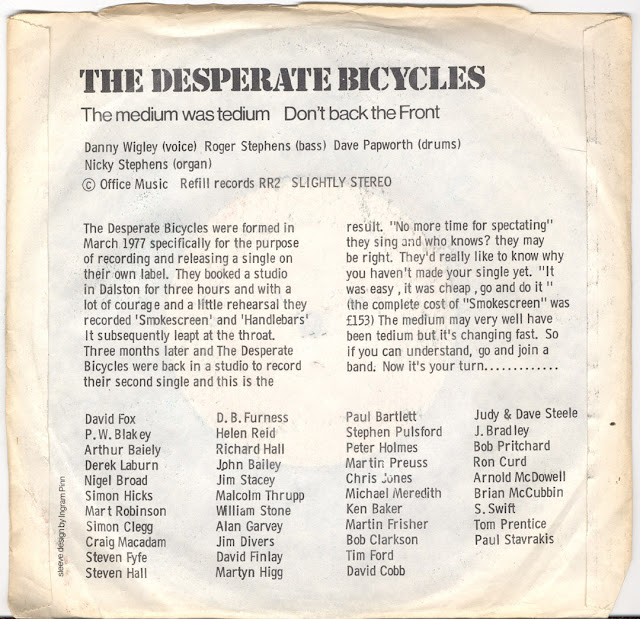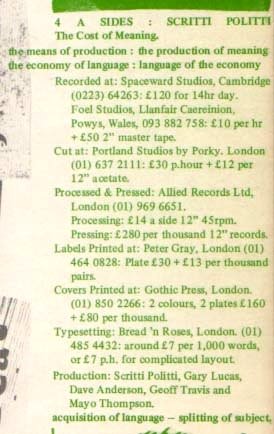
One: Rough Trade and the 1970's
How did Rough Trade start?
Geoff Travis travelled around America, to keep in touch with his passion with music he bought various records from salvation army stores during his travels in America. When arriving back in the U.K. he realised that their was no where for him to enjoy a good and wide variety of music, thus came the idea for "Rough Trade". It was a place were you could listen to any sort of music no matter how obscure and boasted a wide variety of musical genres. The name for the shop stemmed from a Canadian band Geoff had heard of, it was also the name of a trashy novel he had read previously. It was a place in which to just listen to music and chill out and Geoff set up his relaxing record shop in Kensington Park, West London.
Which music trends were popular?
The music that was most popular at the time was the punk genre, as in 1976 punk rock had hit London in particularly hard. It was everywhere and an ever growing popular genre especially amongst the younger generations. Due to the location of "Rough Trade" their was also an influx in Reggae music, as their was big West-Indian communities and many lived by the ways of Rastafarian's. This meant that near "Rough Trade" the two music trends were highly popular and in many ways were battling it out as neither trend understood the other.
What was the ethos of Rough Trade at this time?
Rough Trade was primarily about relaxing and the independence that can come from making music. Their ethos came from the bohemian lifestyle of staying calm and cool. They liked the idea of doing things yourself, as they would urge punk costumers to edit their own "punk magazine". They were a lot about forming other musical trends together as they were responsible for reggae and punk coming together within their community. This alliance would never have been formed if Rough Trades ethos of caring for the music and ignoring the mainstream was not brought to the front.
How was Rough Trade different to large corporations?
Large corporations were all about the profit and taking huge cuts out of their band/artists money. Whereas Rough Trade did not care for profit they were happy to spend months at a time on getting the album right. Apposed to larger corporations who had a time frame, as they are selling catchy mainstream music that everything will like. It was also important at Rough Trade for artists to write their own lyrics, however in large corporations they would a lot of the time pay song writers for this. Most importantly for Rough Trade it was all about the music, their band/artists image would be reflected naturally through whatever they chose to do. Yet bigger corporations would have make a particular image for their artist they would not just leave it to growth of the artist, thus linking again to the issue with time.
What techniques were used to expand the Independent music scene?
The ideology of the Independent label being a "Do it yourself" alternative was it's main feature. They gave artists and bands the opportunity to make their own records without a record label. Rough Trade used techniques such as getting a hold of distribution companies yourself, cutting out the record label as the middle man. It had the alluring appeal to artists at the time who struggled being signed and making their albums especially if they were not mainstream pop or rock music. Daniel Miller was one of these, with an electronic style music he pressed 2,000 records in 1978 started "Mused Records" which later became an important Independent label. This arose in 1977 Richard a member of Rough Trade came up with the revolutionary idea of "Independent nationwide distribution". Artists that took on their techniques were French punks "Metalabam" they pressed their own album and started their own music label. Scritti Politti took on the technique of helping each other they printed their production budget on their album sleeve, so other artists could know what the costs would be. "Desperate Bicycles" also printed a "how to do it" instructions on their album sleeve.
Desperate Bicycles record sleeve, how to do it theory applied:

Desperate Bicycles record sleeve, how to do it theory applied:

How did this lead to Rough Trade's expansion?
Rough Trade realised that they should press their own records and work with the distribution companies themselves. This mean't that they could get everything done independently and more importantly they wouldn't have to share their profits with larger companies. They also followed through with one of their ethos' by helping out other independent record shops, by picking shops in different regions all over England. They would see what records they need and share their unusual records. They expanded the costumers they were looking for and realised they should aim to please everyone because ordinary people should be exposed to all different types of music.
What type of business structure existed in the 1970's?
The structure was to keep everything fair, to care for the music rather than the profit. They cared a lot about politics and with activists who believed greatly in equal pay between the record label and the artist/band.
Explain the successes of the distribution department and record label?
Rough Trade realised that they should press their own records and work with the distribution companies themselves. This mean't that they could get everything done independently and more importantly they wouldn't have to share their profits with larger companies. They also followed through with one of their ethos' by helping out other independent record shops, by picking shops in different regions all over England. They would see what records they need and share their unusual records. They expanded the costumers they were looking for and realised they should aim to please everyone because ordinary people should be exposed to all different types of music.
What type of business structure existed in the 1970's?
The structure was to keep everything fair, to care for the music rather than the profit. They cared a lot about politics and with activists who believed greatly in equal pay between the record label and the artist/band.
Explain the successes of the distribution department and record label?
Rough Trade had signed successful bands and artists in particular, in 1978 Belfast punks "Stiff Little Fingers" were signed on a 50/50 contract and who became vastly popular. In 1979 they released their first album 100,000 copies and Rough Trade had a distribution accolade with them being the first album from an Independent label to sell this many. It number 14 in singles chart and put the label on the map.
Scritti Politti's record sleeve, production cost applied:

No comments:
Post a Comment